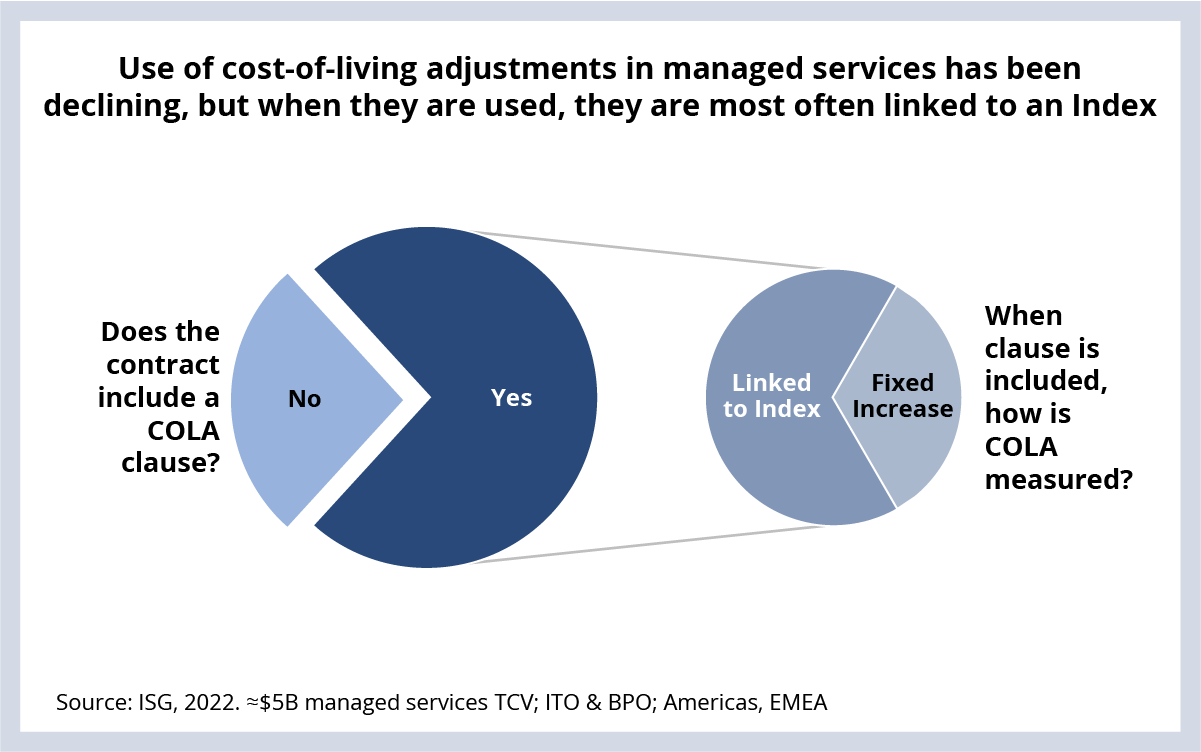Did someone forward you this briefing? If so, subscribe here to get a copy of the Insider in your inbox each Friday.
WAGES & INFLATION
One of the negotiation levers used by buyers and sellers of IT services is a cost-of-living adjustment. A COLA clause protects both the client and the provider from the risk of inflation.
For example: if inflation increases in say, Costa Rica, the cost of living in Costa Rica goes up. Assuming there is a limited supply of qualified people there, providers in Costa Rica need to increase salaries to keep up with inflation – or risk losing people to a competitor. If a provider increases salaries without having accounted for it when the contract was signed, margins will likely suffer. The buyer typically ends up paying for this one way or another – either in increased rates via a renegotiation or in lower service quality.
This is why most managed services contracts have traditionally included a COLA clause. The majority of these clauses are linked to an index like the U.S. Consumer Price Index or India’s Consumer Price Index for Industrial Workers. Though less common, some clauses are based on a fixed increase rather than an index (see Data Watch).
But this is changing. If you look at this through the lens of the enterprise buyer, there are a number of arguments against using a COLA clause in a managed services agreement:
Why should we pay for a salary increase in a region where we don’t do business, when it was the provider that decided to support us from that region?
What happens when the cost of living and wages are not correlated? For example, where inflation is going up, but there are lots of qualified resources available?
Providers should be getting better over time. They should be automating more and reducing not only the headcount to do the work but also the unit cost of each person doing the work.
It’s an administrative headache to manage dozens, if not hundreds, of rates across multiple cost indices when the next contract is just around the corner (especially as deal durations continue to decline).
Given this, we’ve seen a decline in the use of COLA clauses in managed services agreements over the past several years. The risk of not including a clause for both buyers and sellers has been relatively low while inflation has been stable. But things are changing – fast. Inflation in the United States soared to 7% in December 2021. That’s the biggest increase in inflation since 1982.
In the absence of COLA clauses, providers have been – as expected – adding a contingency into their prices over the past several years. The question now becomes: did providers add enough contingency to account for the recent jump in inflation? And for enterprises that have diminished their use of COLA given the arguments above – will they be able to retain their “A” delivery team in an environment where wages are exploding for in-demand skills?
We’re watching this closely as over $35 billion in managed services ACV comes up for renewal over the next couple years.
DATA WATCH

M&A ACTIVITY
- Vista Equity Partners and Evergreen Coast Capital acquiring Citrix for $16.5 billon (link).
- HGS acquiring Australian BPM services firm Diversify (link).
- IBM acquires telecom consulting firm Sentaca (link).
- Asseco acquiring majority stake in Polish contact center automation firm Pirios (link).
- SAP acquiring working capital management FinTech Taulia (link).
